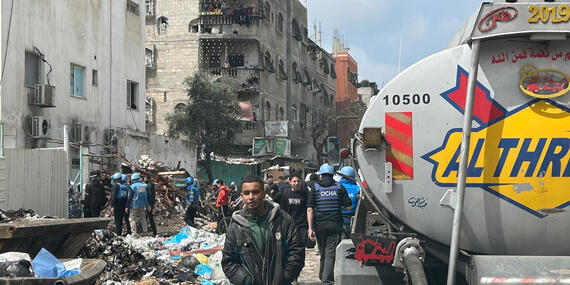Today's top news: Occupied Palestinian Territory, Haiti, Ukraine, Myanmar

Occupied Palestinian Territory
The Israeli military operation in and around Al Shifa Hospital in Gaza city continued for a third straight day.
OCHA continues to call for civilians — including sick and wounded patients and medical staff—to be protected. Hospitals and health care facilities should not be targeted.
The World Health Organization (WHO) has documented 410 attacks on health care in Gaza since 7 October – that’s as of a week ago.
These attacks reportedly caused hundreds of casualties, damaged nearly 100 facilities and affected more than 100 ambulances.
And in the West Bank, WHO has documented 403 attacks on health care since 7 October, during the same period. The attacks reportedly killed nearly a dozen people, injured almost 70 others and affected nearly 50 health facilities and 275 ambulances.
WHO calls for civilians and health care to be protected – and international law to be respected.
Meanwhile, Sigrid Kaag, the Senior Humanitarian and Reconstruction Coordinator for Gaza, is in Cyprus today and tomorrow to for talks on maritime shipments of aid to Gaza.
Haiti
Air transport, in addition to moving humanitarian staff, was able to bring more than 800 kilos of medicine, including blood bags, and other medical supplies in the country. These supplies have been critical for the health response by UN agencies and NGOs, with health facilities being severely affected by the violence.
The air transport has also allowed humanitarian organizations to have sufficient staff in country to continue to deliver aid.
The World Food Programme distributed more than 8,400 hot meals yesterday to people forced to flee their homes in Port-au-Prince.
Ukraine
Ongoing hostilities continued to severely impede the delivery of humanitarian aid and services in January and February, particularly in front-line communities. That’s according to OCHA’s latest assessment of humanitarian access in Ukraine.
The delivery of aid to people in territories occupied by the Russian Federation remains especially challenging.
For example, getting aid to civilians in Avdiivka, in the eastern region of Donetsk, has been impossible since the Russian Federation’s occupation of the city in February.
Most residents there are heavily reliant on humanitarian assistance. The security situation has also made it more difficult to reach neighbouring communities hosting people displaced by the hostilities.
Humanitarian workers in Ukraine also continue to face threats to their security. In January and February alone, aid organizations in the country reported at least 24 incidents impacting humanitarian access, with two aid workers killed and 10 others injured. There were also more than a dozen incidents in which humanitarian assets and facilities were damaged.
Myanmar
The conflict in Myanmar continues to drive humanitarian needs and pose grave protection threats.
In Rakhine, the civilian population is bearing the brunt of the continued fighting between the Arakan Army and the Myanmar Armed Forces, with deadly aerial bombardment and heavy shelling in residential areas. Forced recruitment is also a growing concern. Humanitarian organizations are sounding the alarm over water scarcity in sites housing displaced people, as the area heads into the driest weeks of the year. Some aid is reaching affected communities through local efforts, but it is not enough. stockpiles of life-saving supplies are dwindling, with the cyclone season just around the corner.
In the southeast of the country, airstrikes and shelling have also been reported over recent days in Hopong and Hsihseng (SEE-SENG) townships in southern Shan, reportedly injuring several civilians and damaging homes.
In the Northwest, clashes are severely impacting civilians in the township of Kale in Sagaing. Some 28,000 people have been displaced since the escalation of fighting between the Myanmar Armed Forces and People’s Defense Forces in this area in late February. This includes some 7,000 people who were newly reported as displaced in the last week alone.
Also in the Northeast, more than 20,000 people have been forced to flee their homes in 10 townships in Kachin since the Kachin Independence Army launched a new wave of offensive attacks on 7 March. This has worsened humanitarian needs among an already vulnerable population and aid workers are stepping up to deliver critical assistance where they can.
Funding remains a major challenge to response efforts. The 2024 Humanitarian Needs and Response Plan, seeking $994 million, is just 7 per cent funded at $74 million. Additional resources are urgently needed.
